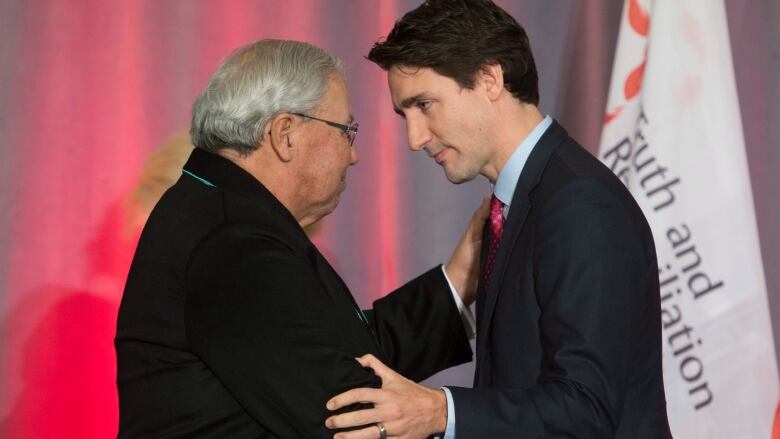TRC promise puts Liberals on track to repeal spanking laws
One of 94 'calls to action' was to ban use of corporal punishment by parents, teachers

Canada's spanking laws areset for an overhaul as part of the Liberal government's promise to adopt all of the recommendations stemming from the Truth and Reconciliation Commission.
One of the 94 "calls to action" after the six-year inquiry into widespread abuse at residential schools for indigenous children was to repeal section 43 of the Criminal Code, which allows parents and teachers to discipline children with"reasonable" force.
- Commission makes 94 'calls to action'
- Spanking law touches off online debate
- Chair says TRC report marks 'new era'
- TRC report by the numbers
"Atthis point, we cannot speculate on potential legislative or policy approaches to address this issue. However the government is committed to implementing all of the 94 calls to action," said Christian Girouard, spokesman for Justice Minister Jody Wilson-Raybould.
The "spanking law" wasupheld by the Supreme Court of Canadain 2004,but set guidelines outlining "reasonable limits" to the act.In that decision, the court ruled that reasonable corrective force can be used against children between the ages of two and 12 years old.
The TRC recommendation has revived a heated national debate on the issue.
Ry Moran, director of theNational Research Centre for Truth and Reconciliation at the University of Manitoba, said in indigenous cultures, children are regarded as gifts "on loan" from the creator, and are to be supported and protected. That means physical punishment is deemed inappropriate.
"If we hit a child, we're hitting creation, and that's something that's just not on. That is something that is not a traditional teaching or a traditional practice," he said.
Moran said the commission likely foresaw the potential broader consequences for all Canadians.
"I would think they would have thought this would have implications and reverberations throughoutsociety," he said. AndI would think... that they were aware of the fact they were putting something out there that had a degree of controversy around it but probably felt this was a necessary and important change to reflect on and implement."
'Risk factor' with spanking
Kathy Lynn of Corinne's Quest, an organization campaigning to end physical punishment of children,toldCBC News Network's Power &Politics that corporal punishmentis a practice that is both outdated and unnecessary. She asked why, in 2015, we are still permittingthe "legalized abuse" of children.
"It sends a message that in our country we believe children should be hurt. And most importantly, research shows that every time we hit a child there is a risk factor involved," she said.
But Diane Watt of REAL Women of Canada, which describes itself as a"pro-family conservative women's movement,"insisted it's necessary to protect parents, teachers and children.
"We're talking about reasonable, moderate, corrective force to improve behaviour and prevent harm that children can cause to one; to put a child in a car seat or remove them from a harmful situation," she said.












_(720p).jpg)


 OFFICIAL HD MUSIC VIDEO.jpg)
.jpg)



























































































